Healthcare systems have been stretched to their limits after the pandemic, revealing various areas where improvement is required. Healthcare systems globally need to be upgraded, and AI chatbots for healthcare are the way to go.
Multiple evolving solutions have use cases for healthcare organizations, such as medical robotics, machine vision, nanotech, AI, etc. Out of these, the most promising and result-oriented option that can be adopted right away is AI-based solutions.
In simple terms, AI-based solutions are software that can understand complex problems and adapt accordingly to provide immediate answers that would not be possible if humans were to solve problems of such a nature.
This software helps save precious time for healthcare professionals, helping them take care of patients better and cutting down on lead time in the formulation of new medicines and drugs that can cure life-threatening diseases.
One such AI-based solution that has multiple applications and is easy to use, available for the healthcare industry is a chatbot.
Types of Healthcare Chatbots
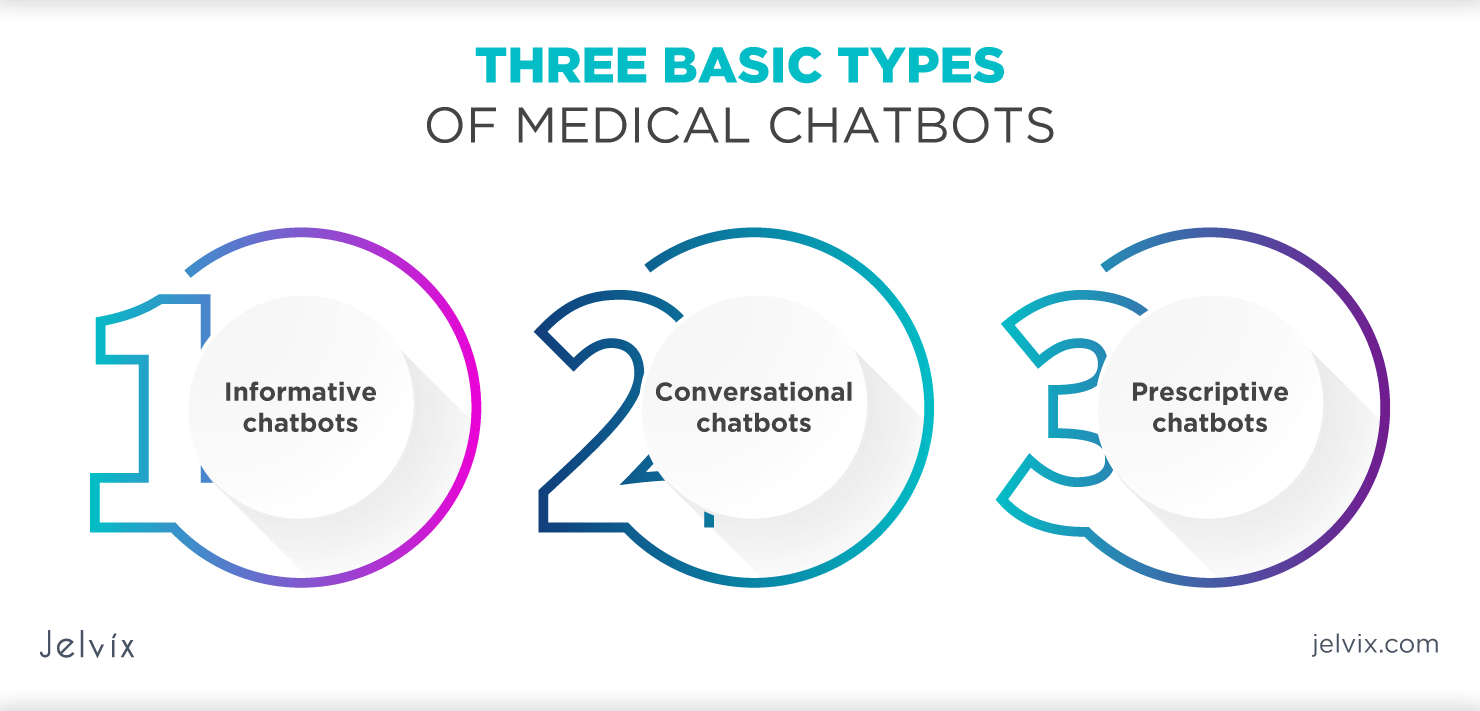
In healthcare, there are three fundamental types of chatbots: prescriptive, conversational, and informative. These three offer different types of solutions, have different levels of communication, and have different conversational styles.
Prescriptive Chatbots
Even though prescriptive chatbots are designed to be conversational, they are intended not only to provide direction or answers but also to provide therapeutic remedies. The remedies and medicinal suggestions are pre-fed to the chatbot. The healthcare chatbot can then handle common customer queries and suggest remedies.
Conversational Chatbots
Conversational chatbots, powered by technologies like NLU and NLP, go beyond pre-built responses, understanding user intent in the context of the entire conversation. These AI-based chatbots closely mimic human interactions and excel in fields like healthcare.
They interpret patient intents, assess the severity of cases, and provide remedies. In emergencies, they can even trigger alerts for healthcare staff, showcasing the advanced capabilities of context-sensitive chatbots.
Informative Chatbots
Users can get important information from chatbots through breaking news, notifications, and pop-ups. Typically, these bots provide automated customer service and data. Mental health and health news websites also use such Chatbots to assist them in acquiring more specific information about a topic. These can also help inform patients about disease breakouts and relevant medicinal information.
Uses of Chatbots in Healthcare
Chatbots are ideal for healthcare due to their versatility. They serve as virtual assistants, automating customer service, appointment bookings, and information dissemination. This automation allows healthcare professionals to focus on critical tasks, enhancing patient care.
Healthcare chatbots can even guide users on proper safety equipment use—for example, providing instructions on donning or disposing of synthetic gloves for infection control.
Patients benefit by easily booking appointments, accessing medical information, and checking bed and ventilator availability through hospital websites. Chatbots save time and mitigate misinformation, providing quick and accurate responses.
AI in healthcare can have some incredible uses, as mentioned below:
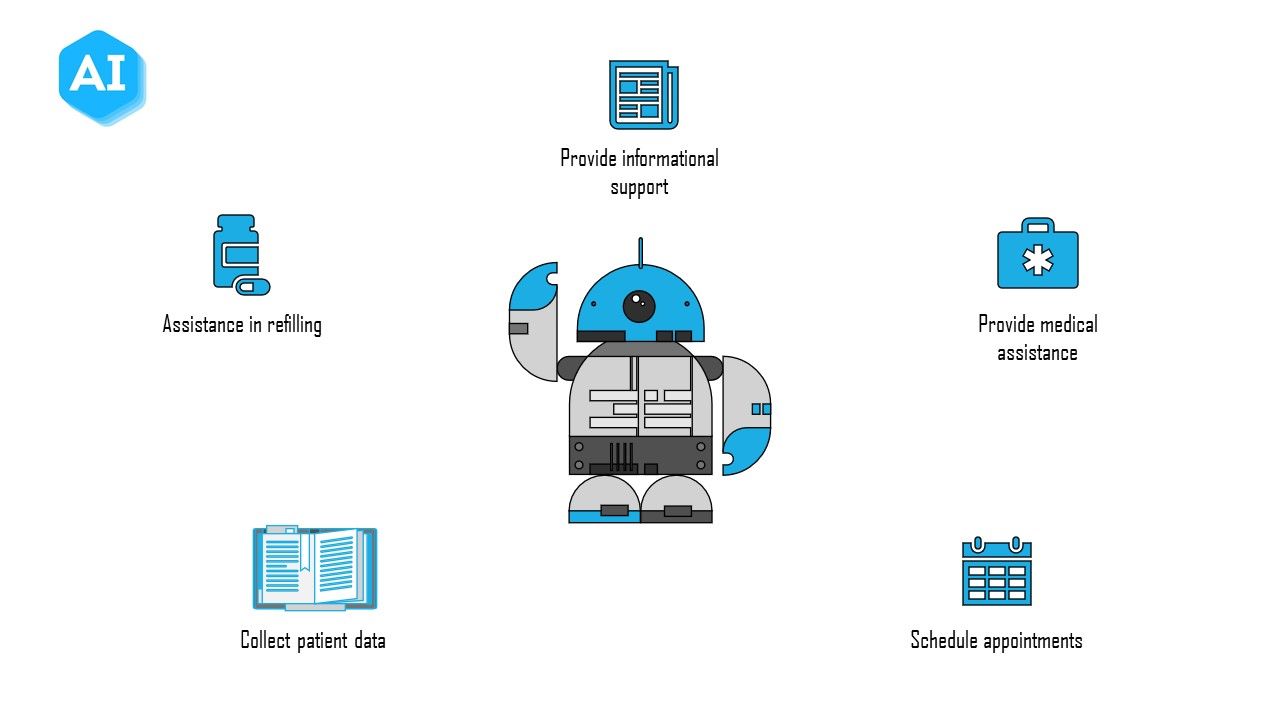
Appointment Management
Streamline healthcare appointments with chatbots, optimizing scheduling, cancellations, and reminders. Improve operational efficiency for both patients and staff, enhancing overall healthcare service delivery.
And, appointment scheduling is just a fraction of the whole automation process that healthcare chatbots can provide.
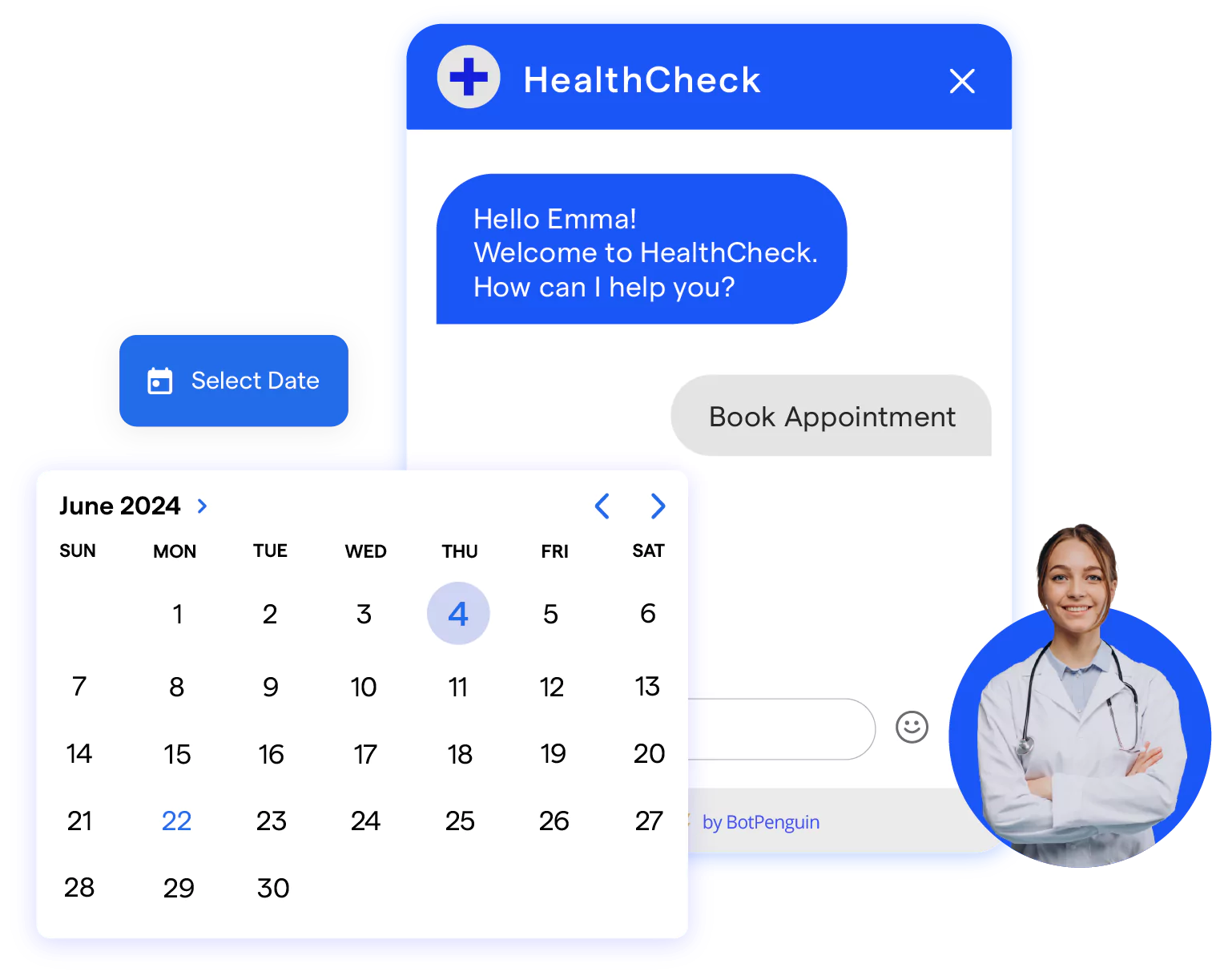
For example, opting for BotPenguin is a real gold rush of features. From automating the lead generation process to customer support automation, from answering patient queries to providing medication reminders, BotPenguin's Chatbots have too much to offer.
And for the sweet dish, deploy a chatbot with all these features on the platform of your choice:
- WhatsApp Chatbot
- Facebook Chatbot
- WordPress Chatbot
- Telegram Chatbot
- Website Chatbot
- Squarespace Chatbot
- woocommerce Chatbot
- Instagram Chatbot
Symptom Assessment
Enable users to confidently assess symptoms and make informed health decisions with the assistance of chatbots. These virtual assistants offer initial guidance based on user inputs, helping users understand their symptoms better. Moreover, chatbots can recommend appropriate actions, whether it's seeking immediate medical attention or providing self-care advice.
Medication Reminders
Enhance medication adherence through timely reminders delivered by chatbots. Ensure patients stick to prescribed schedules, improving overall treatment outcomes and fostering better health management.
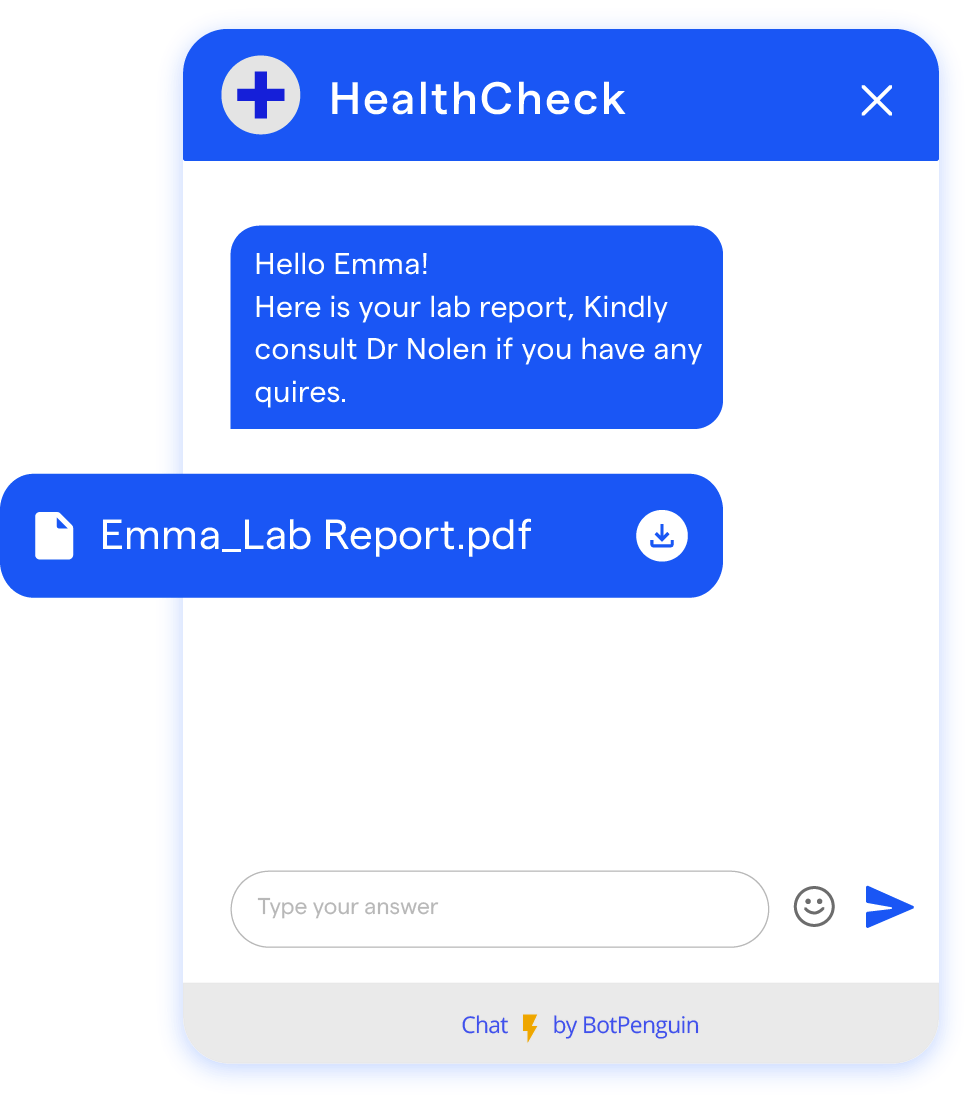
Health Information Dissemination
Deliver accurate and accessible health information with chatbots, educating users on medical conditions, treatments, and general well-being. Foster informed decision-making for better healthcare choices.
Wellness Guidance
Offer personalized advice on lifestyle, fitness, and nutrition with chatbots, contributing to preventive care and promoting overall wellness. Empower users to make healthier choices in their daily lives and track their health.
Suggested Reading:
Launching Healthcare Chatbot in 8 Easy Steps with BotPenguin
Telehealth Consultation
Facilitate virtual consultations with chatbots, providing convenient access to healthcare services. Particularly crucial in remote or urgent situations, ensuring timely medical attention and improving accessibility to care.
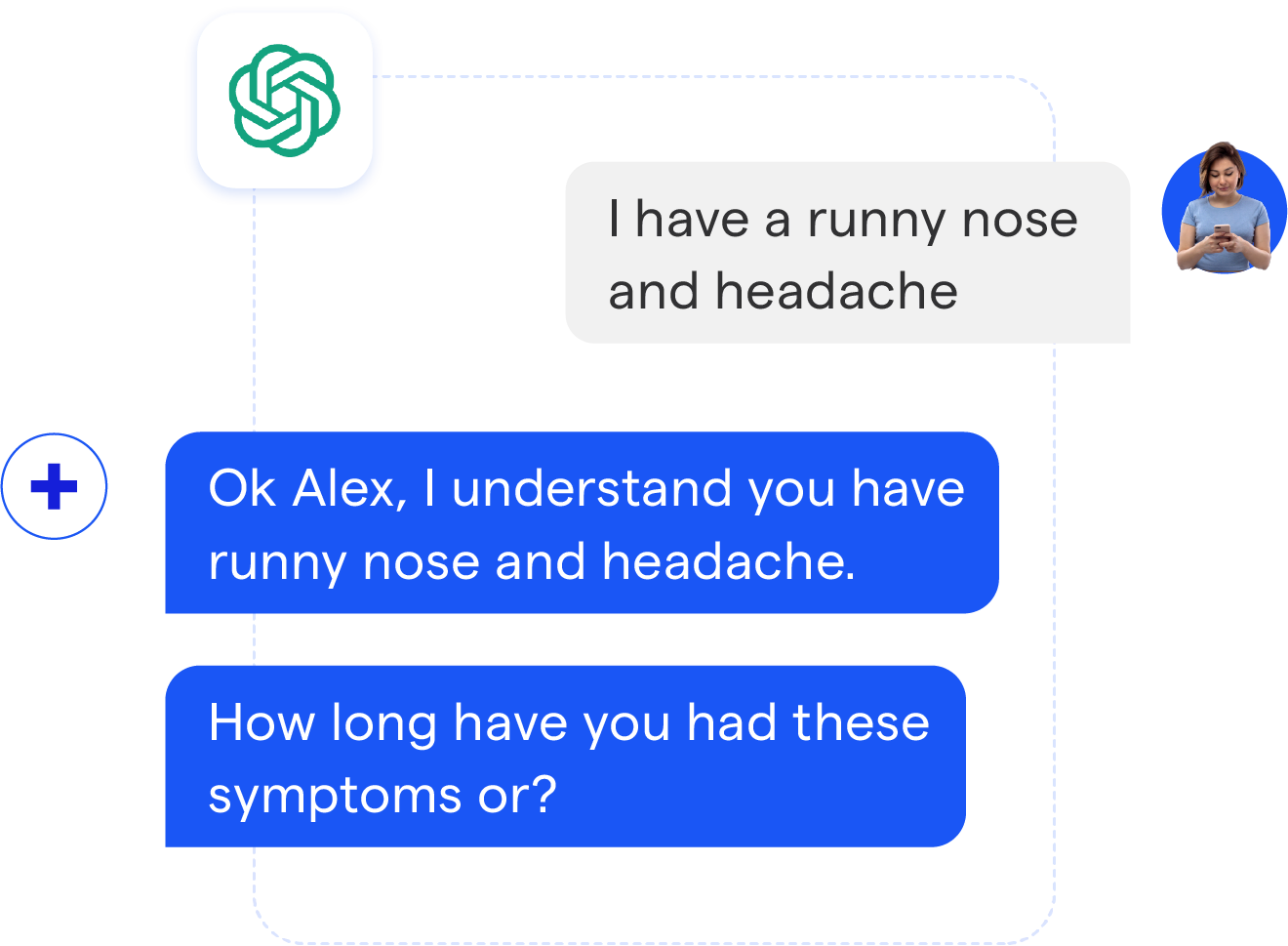
Emergency Response
Provide immediate guidance during emergencies with chatbots, assisting users in accessing appropriate healthcare resources swiftly. Potentially save lives through timely intervention and response to critical situations.
Post-Operative Support
Assist patients during the recovery phase with chatbots, offering post-operative information, managing symptoms, and addressing queries. Enhance patient understanding and comfort throughout the recovery process.
Mental Health Support
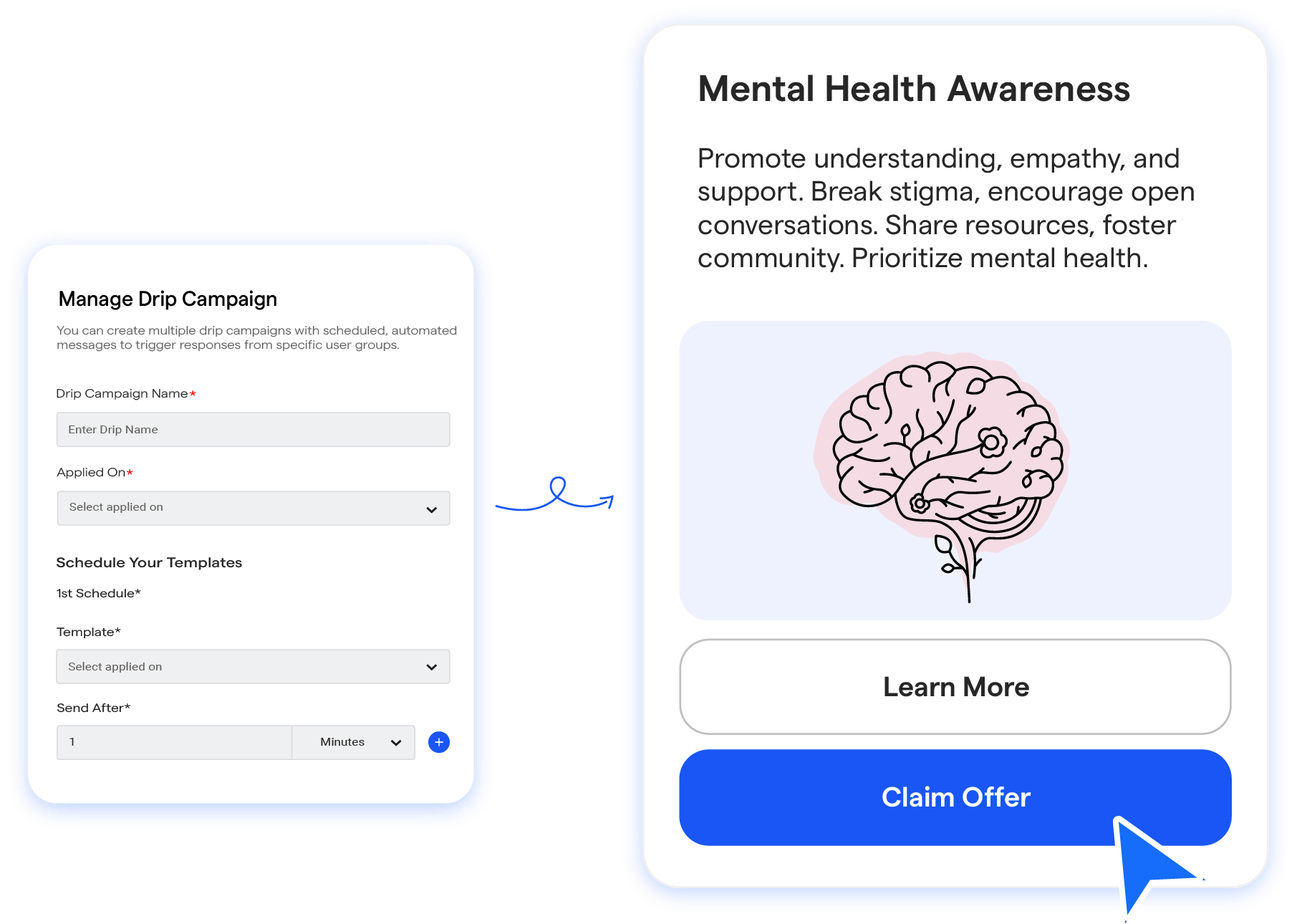
Chatbots serve as confidential companions, offering genuine support and resources for mental health concerns. In times of challenge, they become a reliable space for users seeking assistance, fostering mental well-being through empathy and understanding.
These virtual companions aim to provide comfort and valuable insights to help users navigate difficult moments, emphasizing the importance of mental health in a caring and non-intrusive manner.
Prescription Refill Requests
Enhance the prescription refill process through user-friendly chatbots, allowing users to conveniently request medications. Implementing this technology ensures a seamless and efficient approach to medication management, promoting continuity of care, accessibility, and an improved overall healthcare experience.
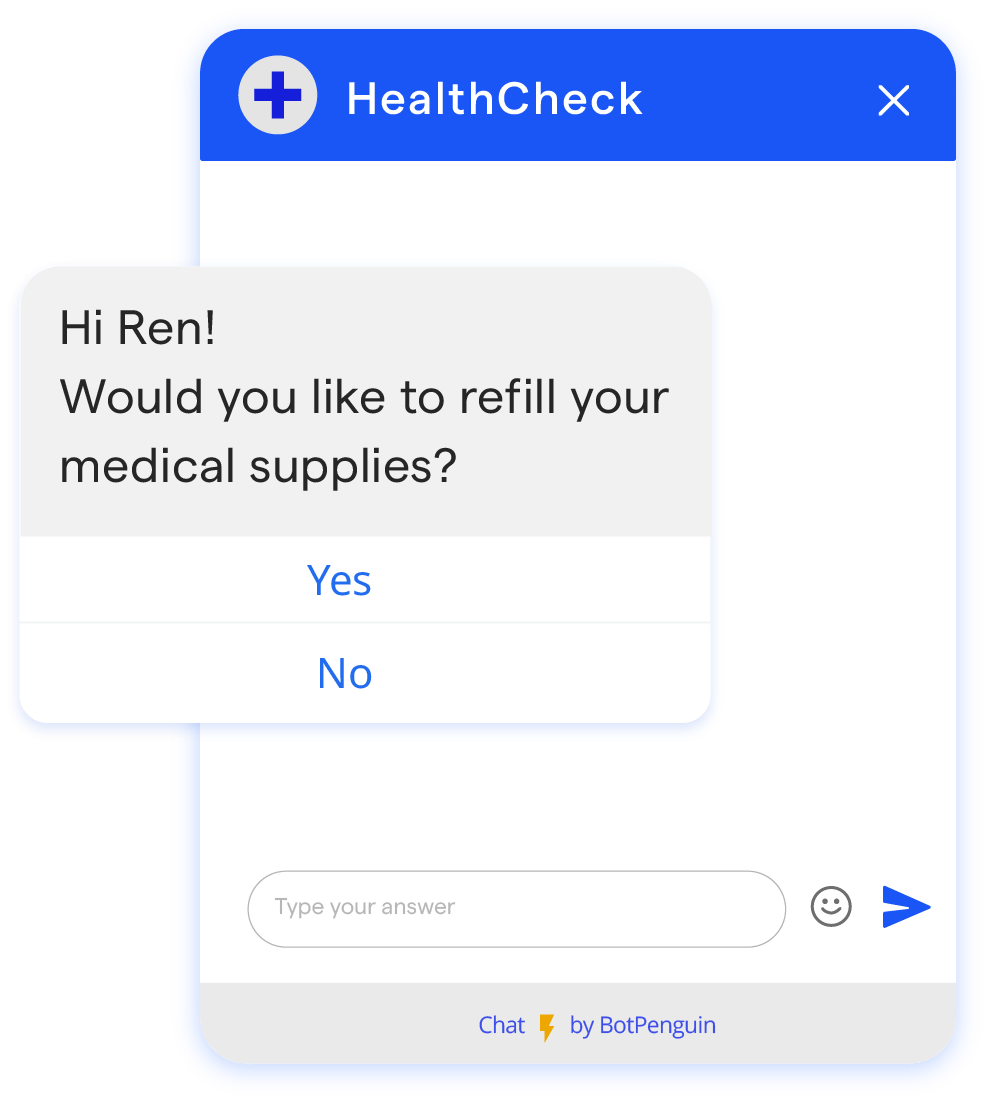
Billing and Claims
Nobody likes dealing with medical bills, insurance companies, or claims. Fortunately, AI chatbots in healthcare can assist with these tasks. Health bots can check current coverage, assist with filing claims, and follow the status of those claims. Furthermore, these healthcare chatbots can assist doctors with billing questions and pre-authorization procedures, saving unnecessary hassles for healthcare professionals as well as customers.
Employment and Training
Large healthcare organizations streamline HR tasks through chatbots in the hiring and onboarding process. Chatbots facilitate seamless onboarding for new hires, offering information, assisting with paperwork, and automating tasks like leave requests. This integration enhances efficiency and simplifies the overall HR workflow.
Benefits of Healthcare Chatbots
Healthcare services can employ and benefit from AI-enabled chatbots in a variety of ways. The following are the advantages of having healthcare chatbots:
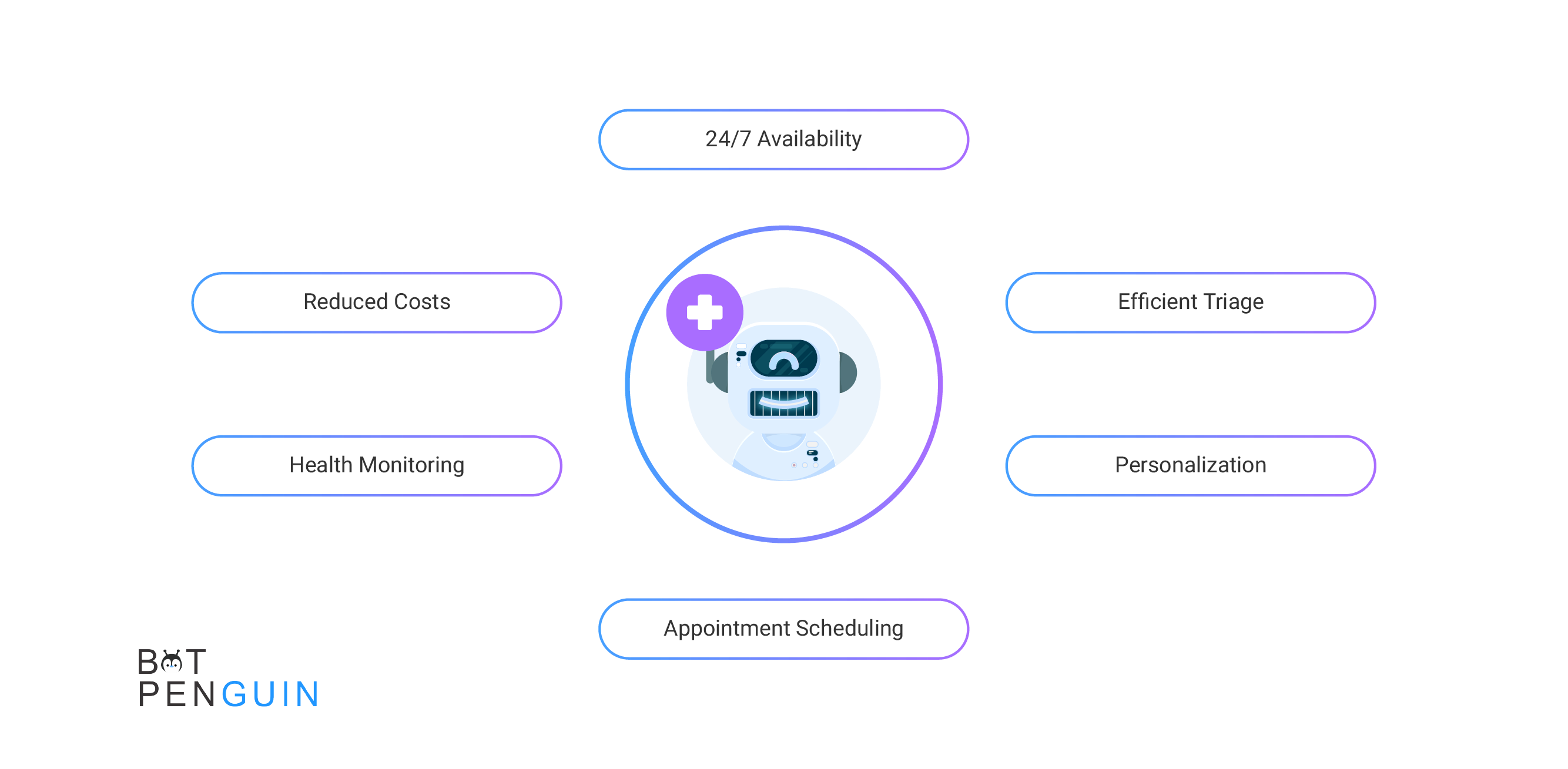
Scalable
When human employees face a surge in inquiries, hiring more staff becomes a costly solution. Chatbots, capable of handling multiple interactions simultaneously, offer a cost-effective alternative, saving resources for healthcare organizations.
Easy Patient Access
With chatbots providing 24/7 information, patients no longer need to visit hospitals during regular hours for minor issues, ensuring easy and convenient access to healthcare guidance.
Cost-Efficient
Healthcare chatbots contribute significantly to global annual savings, estimated at up to $3.6 billion. By efficiently managing tasks, reducing operational costs, and streamlining processes, these AI-driven tools prove instrumental in enhancing the financial efficiency of the healthcare industry, allowing resources to be allocated more strategically.
No Missed Appointments
Healthcare chatbots, with personalized reminders, engage patients proactively, improving the patient-provider relationship. This not only aids in appointment adherence but also enhances healthcare outcomes, mitigating the financial impact of missed visits.
Suggested Reading:
Generate Leads
Processing numerous queries simultaneously, healthcare chatbots enhance customer service, increase brand awareness, and generate leads, contributing to business growth in the healthcare sector.
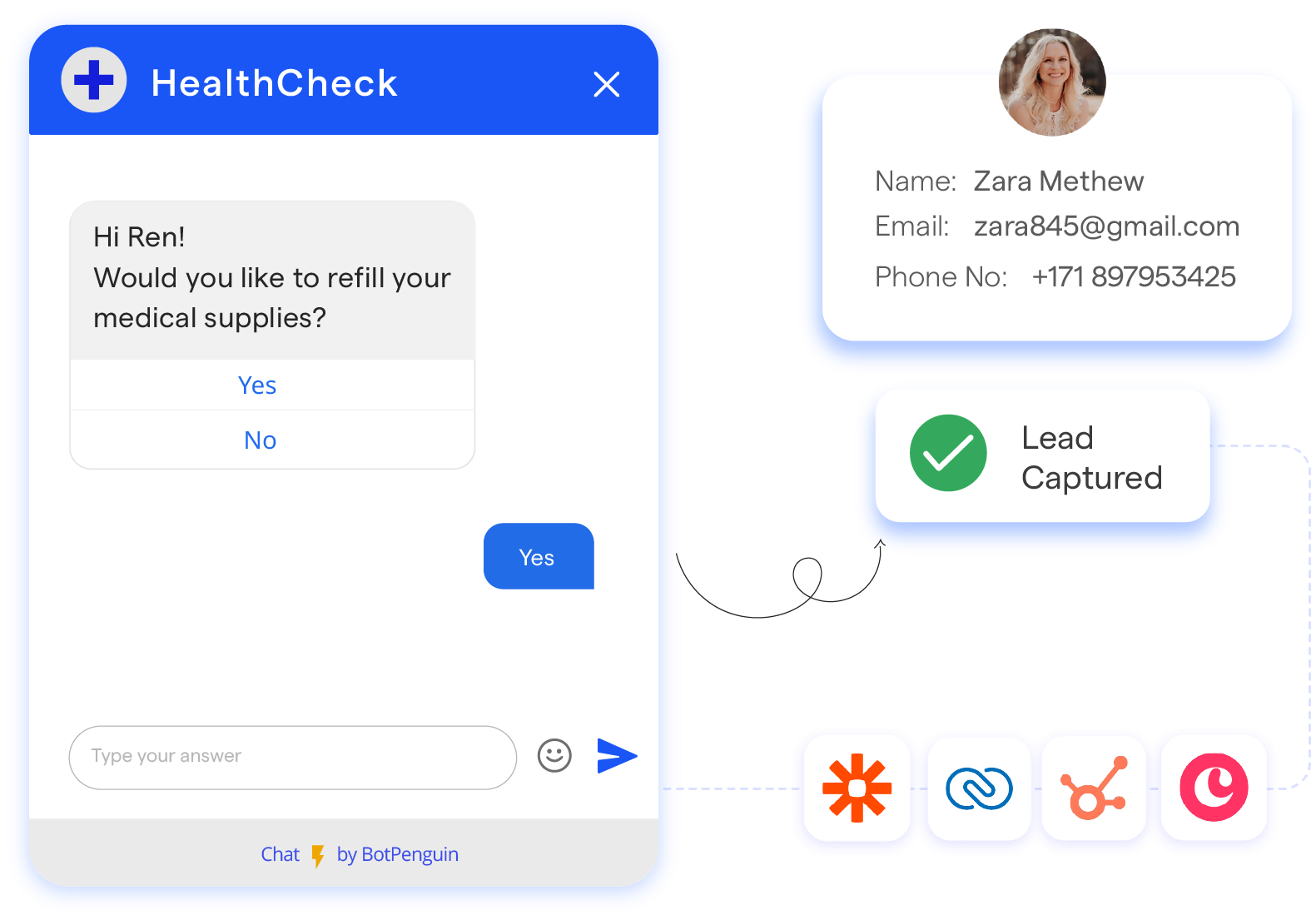
Automates Data Deployment
Efficiently distributing data and seamlessly transitioning between chatbots and human interaction, ensuring effective communication and information flow within healthcare organizations.
Provides Quick Information
Healthcare chatbots play a dual role by assisting with patient encounters and internal record-keeping, utilizing AI to gather crucial data and alerting healthcare professionals promptly.
Delivering Unique Value
By incorporating healthcare chatbots on websites, medical institutions enhance brand identification, showcasing technological innovation and forward-thinking practices in patient communication.
Adapts to the Needs of Healthcare Patients
As patients seek tailored and competent medical care, healthcare chatbots address individual demands, offering personalized interactions and contributing to overall patient satisfaction.
Securing an Up-to-Date Online Presence
Healthcare chatbots, through continuous learning and real-time feedback, help medical organizations maintain a current and responsive online presence, aligning with evolving patient preferences and building trust.
Fully Customizable
Versatile and easily customizable, healthcare chatbots serve individual doctors, clinics, or large hospitals, providing a one-stop-shop solution. Their adaptability makes them a valuable asset across various healthcare settings.
Concerns Surrounding Chatbots in Healthcare
The main concern regarding healthcare chatbots is HIPAA compliance and data security. Critics believe that data captured by chatbots can be stolen, tempered by hackers or other such notorious entities. But such apprehensions can be easily addressed by chatbot-maker companies.
Most of the chatbots such as BotPenguin’s chatbot available in the market are so secure that anytime an application for compliance can be filed and it will be granted in no time.
Future of healthcare chatbots
With technology evolving at a blistering pace, the future of AI can only be imagined and not perceived. We'll see more comprehensive healthcare chatbot solutions appear on the market in the future.
A chatbot, for example, can assist users in checking their symptoms and, based on the diagnosis, scheduling an appointment, answering questions, and even providing direct telemedicine consultation with a doctor via video chat.
When it comes to AI and other creative technical solutions, the healthcare industry has a lot of room for growth. The number of healthcare providers looking into innovative ways to streamline their procedures and reduce wait times is expanding.
The applications of AI in healthcare have no limits and it is safe to say that the healthcare industry will no longer be the same once AI-based solutions become mainstream.
With multiple clients in the healthcare industry, BotPenguin’s healthcare chatbot is already helping doctors, nurses and organizations change the way they do business and treat patients.
If you also want to save money, delight your patients by giving them more time, smooth service, and be available 24*7 to them then try BotPenguin now.
Related Articles:
Frequently Asked Questions (FAQs)
What is a healthcare chatbot?
A healthcare chatbot is a software program that can simulate conversations like humans and assist in various healthcare tasks such as appointment management and symptom assessment.
How does a healthcare chatbot work?
A healthcare chatbot uses AI technology to understand user inquiries and respond with appropriate information or guidance. It can analyze symptoms, provide medication reminders, and offer wellness guidance.
What are the benefits of using a healthcare chatbot?
The benefits of using a healthcare chatbot include improved patient access to information, cost efficiency for healthcare organizations, reduced missed appointments, and personalized interactions for patients.
What are the different types of healthcare chatbots?
There are three types of healthcare chatbots: prescriptive chatbots, conversational chatbots, and informative chatbots. Each type offers different solutions and communication styles.
Are healthcare chatbots secure and compliant with data privacy regulations?
Most healthcare chatbot providers ensure compliance with data security regulations, such as HIPAA. These chatbots undergo stringent security measures to protect user data and prevent unauthorized access.


